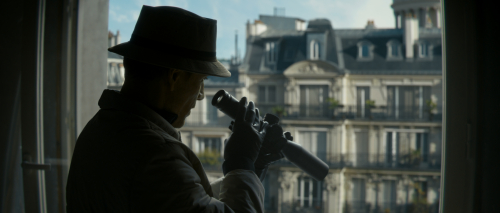
Netflix
MOVIE REVIEW
The Killer (2023)
The through line of David Fincher’s work is contempt. His characters display their contempt for the world around them through elaborately staged revenge plots of various kinds, usually murder. “Gone Girl” was an outlier in his oeuvre in that it was a woman expressing her contempt for her husband, her family and society at large. But with “The Killer” Mr. Fincher is back on home territory with this story of an assassin (Michael Fassbender) who is better than the world and everything in it. Except, of course, this is not true, but Mr. Fincher and his movie only understand one of the reasons why.
The unnamed assassin’s thoughts about his own excellence are provided via voiceover as he works a job in Paris, then on a globetrotting revenge mission as that job in Paris goes wrong. It’s entirely his own fault, incidentally, but this sets the assassin back not at all. It’s clear that for years he has carefully amassed false identities (in the names of characters from American sitcoms of the 1970s and ’80s) by the dozens, enabling him to whip around the world at his leisure and convenience, renting cars and buying stuff off Amazon to his heart’s delight. He dresses like a middle-aged German tourist, to make himself both unappealing and forgettable. He has storage lockers all over the place full of guns, cash, passports, license plates and all the accoutrements needed to get away, repeatedly, with murder. He has clearly spent his lifetime, and a serious chunk of money, putting these fail-safes into place. The work gone into getting that together would have been a much more interesting film.
Instead Mr. Fassbender combines the inhuman calculations of his android from “Prometheus” with the misogynistic hatred of his contract killer from “Haywire” into a joyless performance that’s impossible to care about. Describing the plot in detail is pointless; it involves either a lot of hand-to-hand fighting in darkened rooms or brutally killing unarmed people (mostly women) in well-lit ones. The only real moment of surprise is soundtracked to a song by Portishead and even that song choice is the most surprising thing about it. Most of the actors are unknowns to make up for the globe-trotting travel budget (as well as the opening sequence in France, there’s long sequences in the Dominican Republic as well as four different American cities, including New Orleans, where the thematically aligned though not remotely similar “Hit Man,” which also showed at the London Film Festival, is also set). The sole exception is Tilda Swinton, who gets a scene in a restaurant where she chooses to talk instead of to fight. This is a relief despite its unrealism. Instead of murky action we get a spark of mutual recognition immediately followed by an instantaneous calculation as the meaning hits. Small and contemptuous as it is, it’s about the only human moment in this movie.
Mr. Fincher and screenwriter Andrew Kevin Walker burst onto the world stage with “Seven” back in 1995. That frightening, cynical, sour movie had a beating heart at its core, a level of humanity that was firmly in place despite the horrors that surrounded the characters. The intervening decades have removed that humanity and replaced it entirely by capitalism, as captured in the final sequence where the killer confronts a billionaire (Arliss Howard) wearing a Sub Pop T-shirt. There’s nothing there anymore, “The Killer” tells us, only the trappings of what used to be.
So why make this movie? If the point is showing how bottomless money removes your humanity it would have been way more interesting from the billionaire’s point of view. If the point is showing how careful preparation and buckets of cash can circumvent the surveillance state without the backing of a government, there could have been a sense of risk to it, something vivid and alive. Instead Mr. Fincher wanted to piss on us and say it’s raining. It’s such a bore.
Comments